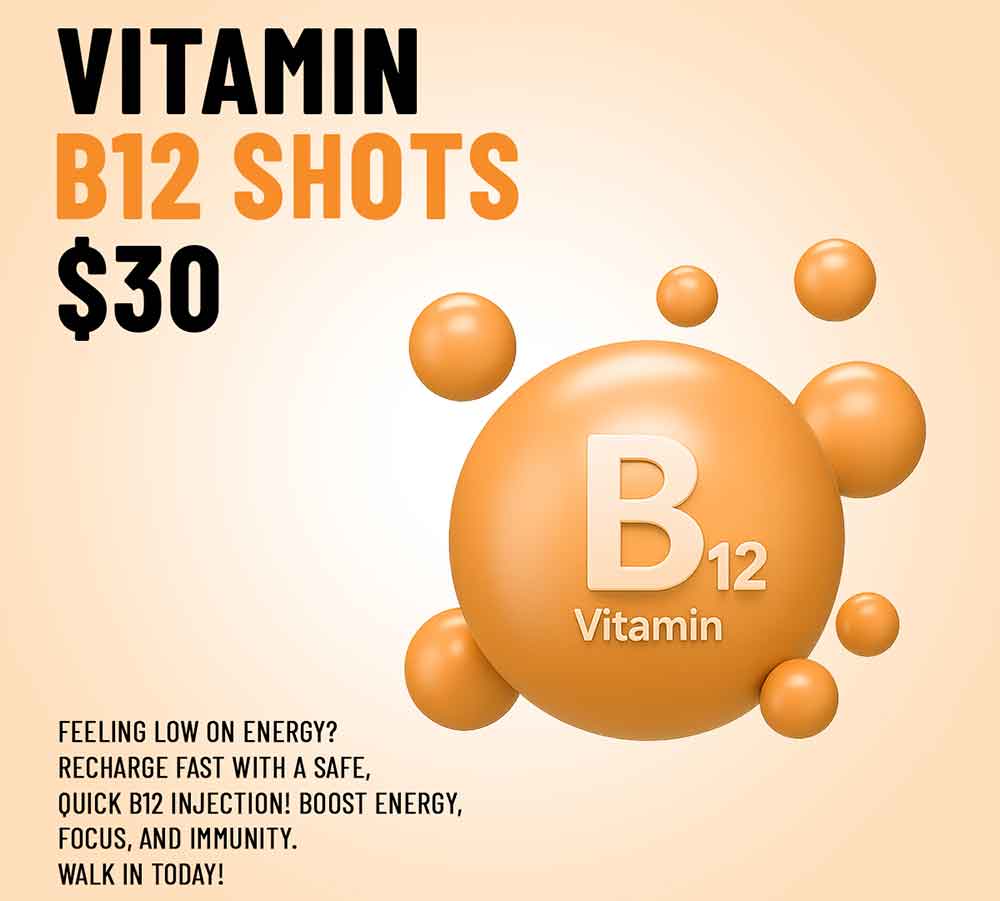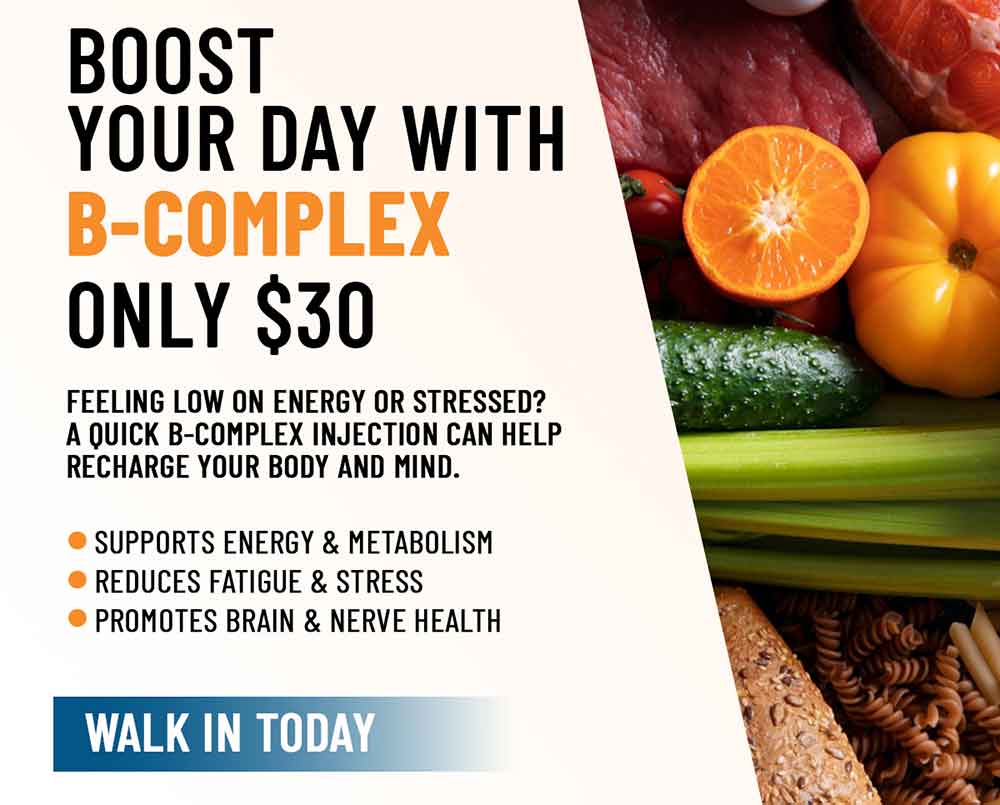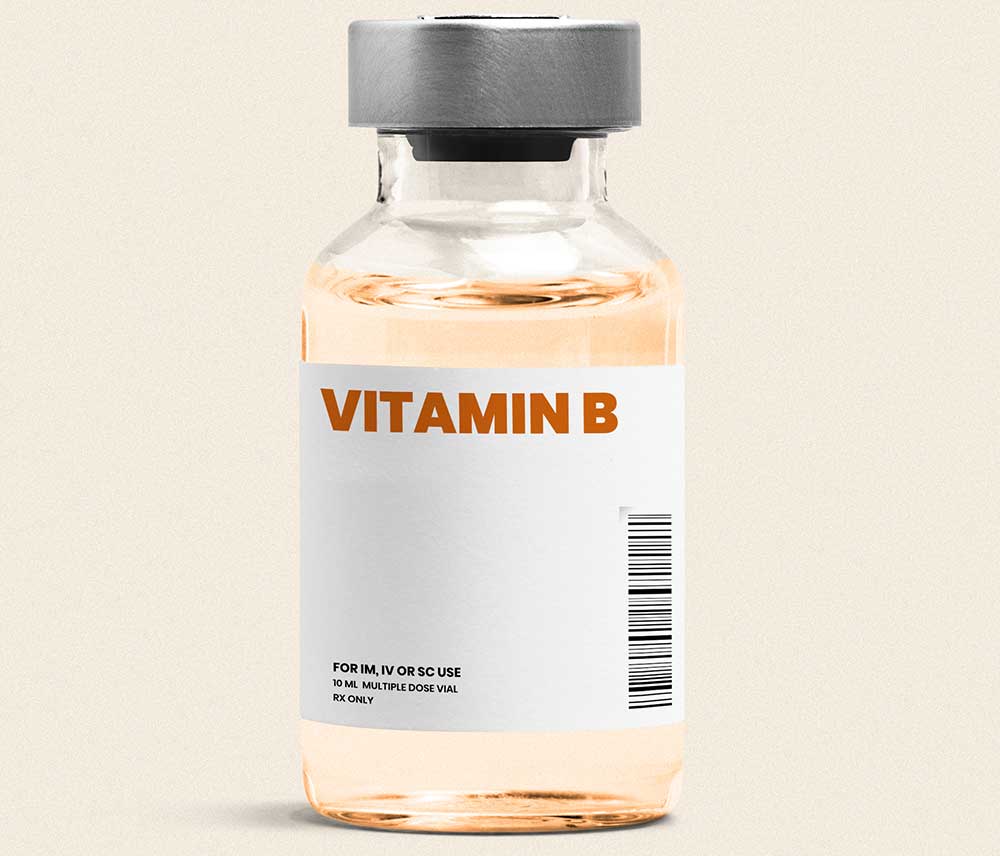
By Dr. Shelise Edwards, MD, FACEP.
Sarah had been dragging herself through each day for months. The 34-year-old marketing manager would hit snooze five times every morning, gulp down three cups of coffee by noon, and still feel like she was moving through molasses. Her colleagues noticed she seemed distracted during meetings. Her husband worried about her constant exhaustion. “Maybe I just need more sleep,” she told herself, even though she was already sleeping nine hours a night.
Sound familiar? Sarah’s story mirrors what thousands of Houstonians experience every single day—a persistent, nagging fatigue that no amount of rest seems to fix. What Sarah didn’t know was that her body was running on empty, specifically lacking one of the most crucial nutrients for energy production: vitamin B12.
After finally visiting enTrust Immediate Care Urgent Care Center in Houston, TX, Sarah discovered that a simple vitamin B shot could be the missing piece in her health puzzle. Within days of her first injection, she noticed a difference. Within two weeks, she felt like herself again—energized, focused, and ready to tackle her busy life.
If you’ve been wondering whether vitamin B shots might be right for you, you’re in the right place. This comprehensive guide will walk you through everything you need to know about vitamin B injections, from understanding what they are to deciding if they’re the solution your body has been craving.
We’ll show you everything you need to know about their role in well-being, and when discussing potentially getting a Vitamin B Shot with your Primary Care Physician (PCP) might be beneficial.
What Exactly Are B Vitamins? Supporting Your Body’s Engine
Vitamin B shots are intramuscular injections that deliver concentrated doses of B vitamins—most commonly B12 (cobalamin), but sometimes including B6 (pyridoxine) and other B-complex vitamins—directly into your bloodstream.
Think of your body as a complex machine that requires various components and fuel to run efficiently. B vitamins are like essential fluids and parts needed for the smooth operation of many bodily processes.
B vitamins are a group of water-soluble vitamins that play critical roles in cellular metabolism, converting food into energy, and maintaining healthy nerve function, among other things. While Vitamin B is often obtained through diet, some of us might benefit from an additional boost of this essential vitamin.
The Science Behind the Vitamin B Shot
Here’s what makes vitamin B shots so effective: when you take an oral vitamin B supplement, your body has to work hard to absorb it. The vitamin travels through your stomach acid, gets processed by your digestive system, and only then—if your gut is healthy enough—does it enter your bloodstream. Along this journey, you lose a significant portion of the vitamin’s potency.
With an injection, we’re talking about 100% bioavailability. Every microgram of that vitamin goes directly into your muscle tissue, where it’s immediately absorbed into your bloodstream and transported to your cells. It’s the difference between sending a letter through regular mail and hand-delivering it directly to someone’s doorstep.
A Symphony of B Vitamins
The term “B vitamin” refers to eight distinct vitamins, each with unique and vital functions.
B-Complex Shots: These combine multiple B vitamins, including B1 (Thiamine), B2 (Riboflavin), B3 (Niacin), B5 (Pantothenic acid), B6 (Pyridoxine), B7 (Biotin) and B9 (Folate). Think of this as the premium package—addressing multiple nutritional needs at once.
Vitamin B1 (Thiamine), B2 (Riboflavin), B3 (Niacin), B5 (Pantothenic Acid), B6 (Pyridoxine) are integral to metabolic processes, helping your body utilize carbohydrates, fats, and proteins for energy.
Vitamin B7 (Biotin): Known for its role in supporting healthy hair, skin, and nails by aiding in the production of keratin.
Vitamin B9 (Folic Acid): Crucial for the formation of red blood cells, DNA synthesis, and repair.
Vitamin B12 (Cobalamin): Essential for neurological health, red blood cell formation, and energy metabolism. Vitamin B12 (Cyanocobalamin or Methylcobalamin) is the most common type of B shot, primarily used to boost energy, improve mood, and support nerve function. B12 is essential for red blood cell formation, DNA synthesis, and maintaining healthy nerve cells. A deficiency can lead to fatigue and potential nerve damage.
Ensuring adequate intake of these vitamins through a balanced diet is important for overall health.
When to Consider B Vitamin Support: Recognizing Potential Needs
Identifying a potential need for increased B vitamin intake often starts with recognizing certain signs and discussing them with your PCP.
Mark, a 42-year-old construction foreman from Houston. TX, thought the tingling in his hands and feet was just from gripping tools all day. He assumed his memory lapses were normal aging. The persistent brain fog? Well, that’s what happens when you’re working 60-hour weeks, right?
Wrong. Mark was experiencing classic symptoms of vitamin B12 deficiency, and he had no idea his body was sending out urgent distress signals.
If you are experiencing persistent fatigue and difficulty concentrating, pay attention. While these symptoms can stem from many causes, your PCP or healthcare provider might consider if a B vitamin deficiency is a contributing factor. After an evaluation, the provider might suggest dietary changes or discuss the possibility of a Vitamin B boost.
You might want to discuss your B vitamin status with your PCP or healthcare provider if you experience any of the following symptoms.
- Persistent Fatigue and Low Energy: While common, persistent tiredness warrants investigation into potential causes, which could include B vitamin levels.
- Mental Fog and Difficulty Concentrating: B vitamins are important for brain and nerve health; impaired levels can sometimes contribute to cognitive issues.
- Weakened Immune System: B vitamins play a role in supporting the immune system.
- Physical Stress and Anxiety: Periods of stress or persistent stress and anxiety can impact nutrient levels.
- Pale Skin: A B12 deficiency can sometimes lead to a type of anemia that affects skin tone.
- Specific Dietary Needs: Individuals following vegan or vegetarian diets may be at higher risk of B12 deficiency and should discuss this with a healthcare provider.
- Digestive Issues: Certain medical conditions affecting digestion can impact nutrient absorption.
Conditions outlined above are not all inclusive, and your PCP or healthcare provider may perform tests to assess your B vitamin levels and determine if supplementation, such as through diet or Vitamin B boost, is appropriate for you.
Let’s be clear: everyone feels tired sometimes. But B vitamin deficiency or function isn’t about needing an extra hour of sleep or having a sluggish afternoon. It’s a bone-deep exhaustion that doesn’t respond to rest. It’s waking up tired even after a full night’s sleep. It’s feeling like you’re constantly running on 20% battery, no matter what you do.
If you find yourself relating to this—if you’re tired of being tired—your body might be crying out for vitamin B.
B vitamins, especially B12, are critical for nervous system health. When you’re deficient or have poorly functioning B12, your nerves literally can’t function properly. This can manifest as:
- Numbness or tingling in your hands, feet, or legs (like Mark experienced)
- Balance problems or feeling unsteady when walking
- Memory issues or difficulty concentrating (that “brain fog” everyone talks about)
- Mood changes including depression, irritability, or anxiety
- Confusion or difficulty thinking clearly
These aren’t just inconveniences—they’re your nervous system waving a red flag, desperately trying to get your attention.
Click the image below to order your Vitamin B Shot from enTrust Immediate Care.
Important Things to Consider Before Getting B Vitamins
While essential, discussing any form of supplementation with a healthcare professional is crucial to ensure it’s appropriate for your individual needs and health status.
It is important to discuss your medical history with your healthcare provider.
Certain situations may require caution or avoidance of specific B vitamin supplementation, including –
A history of allergies – While rare, allergic reactions to components in supplements can occur.
Specific Medical Conditions
Kidney Disease: As water-soluble vitamins, B vitamins are processed by the kidneys. Individuals with kidney issues should consult a specialist before getting a Vitamin B shot.
If You Are Pregnant or Breastfeeding: While essential, appropriate dosages and forms of B vitamins should be discussed with our specialists.
The Digestive System Connection
Here’s something most people don’t realize: your gut health directly impacts your B vitamin levels. If you have conditions like Crohn’s disease, celiac disease, or have had gastric bypass surgery, your digestive system may struggle to absorb B12 from food—even if you’re eating all the right things.
People with chronic digestive issues often describe it as “eating perfectly but still feeling terrible.” If this sounds like you, vitamin B shots might bypass the absorption problem entirely, delivering nutrients your gut can’t handle on its own.
Who’s at Highest Risk of Vitamin B Deficiency?
Certain groups are particularly vulnerable to B vitamin deficiencies. If you are suffering from the following condition, consider Vitamin B shots from enTrust Immediate Care Urgent Care Center.
Vegetarians and Vegans: Since B12 is found primarily in animal products, plant-based eaters often struggle to get enough through diet alone. If you haven’t eaten meat in years and you’re feeling constantly exhausted, this could be your missing link.
Adults Over 50: As we age, our stomach produces less acid, making it harder to extract B12 from food. That’s why the energy levels that carried you through your 30s might suddenly vanish in your 50s.
People on Certain Medications: Metformin (for diabetes), proton pump inhibitors (for acid reflux), and some antibiotics can interfere with B vitamin absorption. If you’ve been on these medications long-term and notice declining energy, connect the dots.
Pregnant and Breastfeeding Women: Your baby is literally building a body from scratch using your nutrients. B vitamins are crucial for fetal development, and many mothers become depleted during pregnancy and the postpartum period.
People with Autoimmune Conditions: Conditions like pernicious anemia prevent your body from absorbing B12, no matter how much you consume. This isn’t about eating better—it’s about finding an alternative delivery method.
When Vitamin B Shots Aren’t the Right Choice
While vitamin B shots can be transformative for many people, they’re not appropriate for everyone, and they’re not a cure-all for every type of fatigue or health issue.
When Fatigue Isn’t About B Vitamins
Not all exhaustion is a result of vitamin B deficiency. If you’re struggling with persistent fatigue, vitamin B shots might help—but they might not address the underlying cause if your exhaustion is due to:
- Sleep apnea: No amount of B12 will fix a condition where you stop breathing dozens of times per night.
- Thyroid dysfunction: Hypothyroidism causes crushing fatigue that requires thyroid hormone replacement, not vitamin supplementation.
- Chronic fatigue syndrome or fibromyalgia: These complex conditions may have nutritional components, but they typically require comprehensive treatment approaches.
- Depression or anxiety disorders: While B vitamins support mental health, clinical mental health conditions usually need psychological and sometimes pharmaceutical intervention.
- Anemia from iron deficiency: B12 helps with certain types of anemia, but iron-deficiency anemia requires iron supplementation.
This is why the initial consultation at enTrust Immediate Care is so important. We do not just give shots—we help you feel better. Sometimes that means vitamin B shots are the perfect solution. Sometimes it means identifying and addressing a different issue entirely.
The Importance of Realistic Expectations
Vitamin B shots are powerful tools, but they’re not magic. If you’re expecting:
- Immediate, dramatic weight loss: B shots can support metabolism and energy for exercise, but they’re not weight-loss injections.
- A cure for chronic diseases: B vitamins support overall health but don’t cure conditions like diabetes, heart disease, or autoimmune disorders.
- Permanent transformation from a single injection: Most people need a series of shots, and many require ongoing maintenance.
Setting realistic expectations ensures you’ll be satisfied with your results rather than disappointed by misunderstood promises.
Allergies and Side Effects of Vitamin B Shots
Let’s address the elephant in the room: What could go wrong? While serious reactions to vitamin B shots are extremely rare, being informed means understanding both the common, minor side effects and the rare but serious allergic reactions.
Common Side Effects of Vitamin B Shots (Usually Mild)
Most people tolerate vitamin B shots beautifully with minimal or no side effects. However, some people experience the following side effects.
Injection Site Reactions: Mild pain, redness, or swelling at the injection site is the most common side effect. Think of it like the soreness you might feel after any intramuscular injection. It typically resolves within a day or two.
Mild Nausea or Upset Stomach: Some people feel slightly queasy after their injection, particularly if they received it on an empty stomach. This is usually brief and mild.
Headache: Occasionally, people report mild headaches after B vitamin injections, particularly in the first few doses. This often diminishes as your body adjusts.
Feeling “Wired” or Energized: If you’ve been deficient for a long time, the sudden influx of B vitamins can feel almost too energizing. Some people report difficulty sleeping if they receive their injection late in the day. That’s why we typically recommend morning or early afternoon appointments.
Pink or Red Urine: Don’t panic if you notice your urine is bright yellow or even pinkish after a B shot. This is completely normal—it’s just your body excreting excess B vitamins that you don’t need. Your body takes what it needs and safely eliminates the rest.
The Real-Life Impact: Stories from Houston
Let me share a few more stories from real patients who’ve walked through the doors at enTrust Immediate Care in Houston (names changed for privacy, but experiences very real).
Jennifer’s Journey: From Brain Fog to Business Success
Jennifer, a 51-year-old small business owner, had been struggling with memory problems so severe she thought she might have early-onset dementia. She’d forget client names mid-conversation, lose track of what she was saying during presentations, and spend hours looking for things she’d just set down.
After three months of B12 injections at enTrust, she described the change as “night and day.” Her memory sharpened, her confidence returned, and her business—which had been suffering as her symptoms worsened—began thriving again. “I got my edge back,” she told us during a follow-up visit.
Michael’s Turnaround: The Vegan Athlete’s Dilemma
Michael was a dedicated CrossFit athlete and had been vegan for five years. He was meticulous about nutrition, ate a well-planned diet, and took oral B12 supplements daily. So why was his performance declining? Why did he feel exhausted despite sleeping eight hours every night?
Turns out, his body wasn’t absorbing the oral supplements effectively. Within two weeks of starting B12 injections, his workout recovery improved dramatically. His lifting numbers went back up. His endurance returned. He continued his vegan lifestyle, but now with the B12 delivery method his body actually needed.
Patricia’s Relief: Numbness No More
Patricia had been dealing with numbness in her feet for over a year. Multiple doctors had run tests but found nothing conclusive. She was beginning to accept that this might be her new normal—until a friend suggested she get her B12 levels checked.
She was severely deficient. After a series of weekly B12 injections at enTrust, the numbness began to fade. Three months later, the sensation in her feet had returned almost completely. She cried during one of her appointments, overwhelmed with relief that such a simple solution had ended over a year of discomfort and worry.
Making the Decision: Is It Time for You?
You’ve made it this far in this guide, which suggests you’re seriously considering whether vitamin B shots might be right for you. Let’s bring it all together and help you make an informed decision.
——————————————————————————————
 Dr. Shelise Edwards, MD, FACEP, is a board-certified emergency medicine physician. She currently serves as Medical Director of enTrust Immediate Care in Houston, TX. Originally from Tallahassee, FL, she completed her medical school training at Morehouse School of Medicine in Atlanta, and her emergency medicine residency training at The University of Chicago in 2005. She worked as an attending physician in Atlanta as well as Chicago, before relocating to Houston in 2011. Dr. Edwards enjoys spending time with her husband and 2 kids relaxing at home, watching movies and traveling.
Dr. Shelise Edwards, MD, FACEP, is a board-certified emergency medicine physician. She currently serves as Medical Director of enTrust Immediate Care in Houston, TX. Originally from Tallahassee, FL, she completed her medical school training at Morehouse School of Medicine in Atlanta, and her emergency medicine residency training at The University of Chicago in 2005. She worked as an attending physician in Atlanta as well as Chicago, before relocating to Houston in 2011. Dr. Edwards enjoys spending time with her husband and 2 kids relaxing at home, watching movies and traveling.






